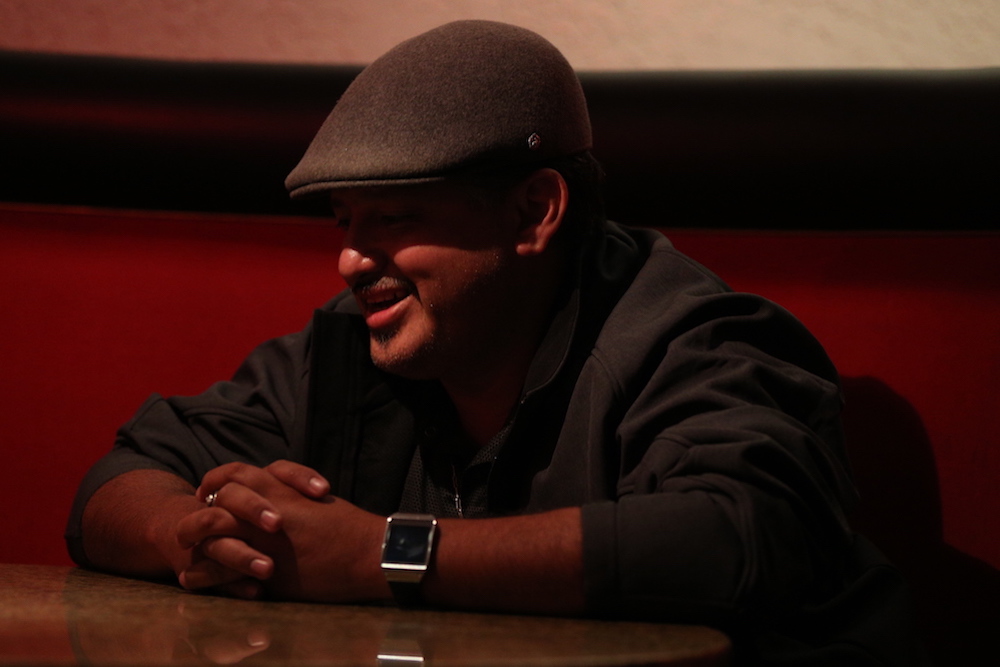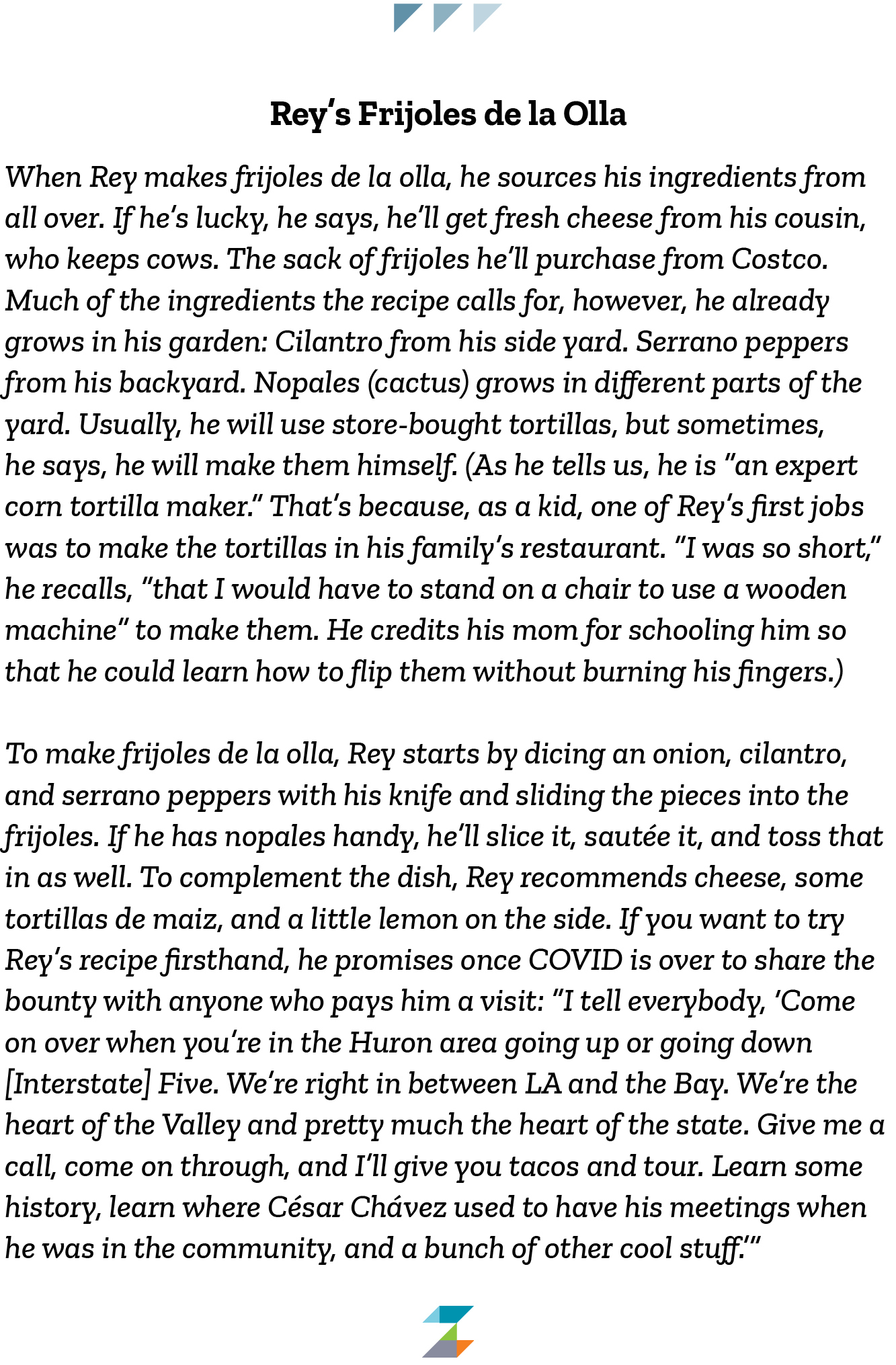
Huron Mayor Rey León. Photo by James Ramirez.
Rey León is the mayor of the town of Huron, California. Born in Fresno and raised in the Huron area, he has been organizing in the Central Valley for the past 20 years. He is the founder and executive director of the San Joaquin Valley Latino Environmental Advancement & Policy Project (Valley LEAP), the founder of the San Joaquin Valley Regional Green Jobs Coalition, and co-founder of the Central Valley Air Quality Coalition. Before joining the panel for a Zócalo/The California Wellness Foundation streamed event titled “How Can We Make Farm Work Healthier,” he paid a visit to the virtual green room to chat about his love of Bruce Lee, unlocking the power of Leónium, and the recipe for a comfort food that he describes as “heaven.”
When you were a child, what did you want to be when you grew up?
You know what? I wasn’t really thinking about that. I was outdoors a lot. I would spend a lot of time outdoors, doing things as simple as staring at ant colonies and providing them live grasshoppers and seeing them go to work. And sometimes bringing in lion ants and putting lion ants around the holes and having them set up their little pits, and seeing the ants fight for their lives to get out of those little pits. Just observing nature. Going to the foothills when I would be at my mom’s in Avenal, and catching scorpions and other little animals, and then going to the creek when I was in Huron with my dad, and chasing rabbits and checking out the burrowing owls and just always trying to be outdoors.
It wasn’t until I was in high school that I started thinking about engineering—electrical engineering—which ultimately didn’t happen. But I’ve always been a science buff, and for a moment at least I was shooting for a bachelor’s in environmental sciences, and very briefly pre-med. Ultimately though, I graduated with a bachelor’s in Chicano studies with an emphasis in public health. But what I do today is, essentially, what I sought out from, I think, the very beginning, which is environmental justice. Advocating for the public health of my people, my community, my family, farmworkers. And working on cleaning the air, and advancing the culture and systems for environmental justice, climate justice, and economic justice.
Little Rey would be very proud, I think.
I thank little Rey a great deal. He put me on this path, and here I am. I think back in high school, in my sophomore year, I learned about UC Berkeley. And I turned to my lab partner—we were going over the transuranium elements, learning of all the ones that were discovered at Berkeley—and I said, “Wow, I’m going to go to Berkeley and discover Leónium!” And we just cracked up. But that put Berkeley in my scope, and I learned that the neighboring high school in the other city, that I had to live in Huron for, that they had a summer program to go to Berkeley. So I asked my mom, got permission, moved to Huron with my dad. And from there went to the corresponding high school, and got into the Berkeley program for that following summer, which was life-changing.
I think back, and I think, “Man, that’s good.” I pat myself on the back for making those moves, to getting me exposed and really to start working on finding the rest of my life essentially. And so when I give the speech and I talk to youth, to kids, I tell them about that story of self-determination, even as a youth. And toward the end I say, “You know one thing that I’ve learned in my life, after all these years of organizing, building coalitions, and passing good policies as a policy advocate, I think back and I come to the realization that Leónium was never meant to be a transuranium element. Leónium is a social justice element, an economic justice element, and the environmental climate justice element. And that’s me, so you’ve got to find out what is your Leónium.”
So, what’s hanging on your refrigerator?
A bunch of magnets from different parts of the country.
I’ve got one cool one—it’s Bruce Lee throwing a kung-fu kick in the air. And I got that one in Seattle. You know, I grew up the youngest of seven siblings. And I was a Bruce Lee buff. I’d always watch whenever Bruce Lee was on, with my brothers, we’d always watch it. And so every time I’ve been to Seattle, I go to the cemetery and visit Bruce Lee’s gravesite.
If you watch Bruce Lee’s movies, he’s always the defender, the advocate, fighting on behalf of the lesser, the workers, the person getting bullied. And that I think defined my own life up to date, you know? I fight for farmworkers. My father was a bracero farmworker. My dad moved lines with the irrigator for over 20 years. And he would point at the farmworkers coming in right after they got out of the fields, tired, you could tell, and hungry. And he would point at them and say, “Look at them guys. Basically, that’s me. That’s how I was.”
What’s the best gift you’ve ever gotten?
The gift of life, and I thank my mother 100 percent, and the fact that her mentorship first and foremost has provided me with strong values, to be able to continue my life today as the advocate that I am, and the leader I’ve become, to serve my people.
Do you have a favorite local band or musician?
I love the oldies. I love hip hop. That’s what I grew up with. But a good friend of mine, he’s a local musician. His name is Lance Canales. He does Chicano, Yankee Blues, Native Blues-type stuff, and some rock and roll. But he also recently, a few years ago, did a redoing of an existing song by Woody Guthrie about the Bracero farmworkers who were being thrown over the Valley to be deported, for nothing other than being Mexican and economic refugees. And the plane crashed, and they all died. And for decades their grave site, they didn’t name them; they didn’t go through the work of getting their names and putting it on the grave sites, and contacting the families. But you know, another friend of mine, who is an author and an artist and a poet, he [Tim Z. Hernandez] did the research and solved it.
Lance Canales redid the song [“Plane Wreck at Los Gatos (Deportee)”], in honor of that.
Rey, what do you do to decompress?
Have a seat, watch a movie, make me a good dish. Something special to grub down on, to eat. You know, I’m not afraid of the kitchen or making food. Maybe a little bit of mezcal, little bit of tequila, maybe a good beer and hanging out with friends, and just chewing the fat, talking smack and cracking up, sharing stories, and maybe talking some politics, getting fired up like a revolution, and just connecting with good people.
Can you share with us a comfort food recipe that you like to make that uses local ingredients?
Sometimes I’ll be really hungry, and what I love to eat, especially on a nice spring day, or even on a nice fresh cool day, is frijoles de la olla. That right there is heaven for me, especially if I have a nice hot coffee that has canela in it that can complement it. That is love.




